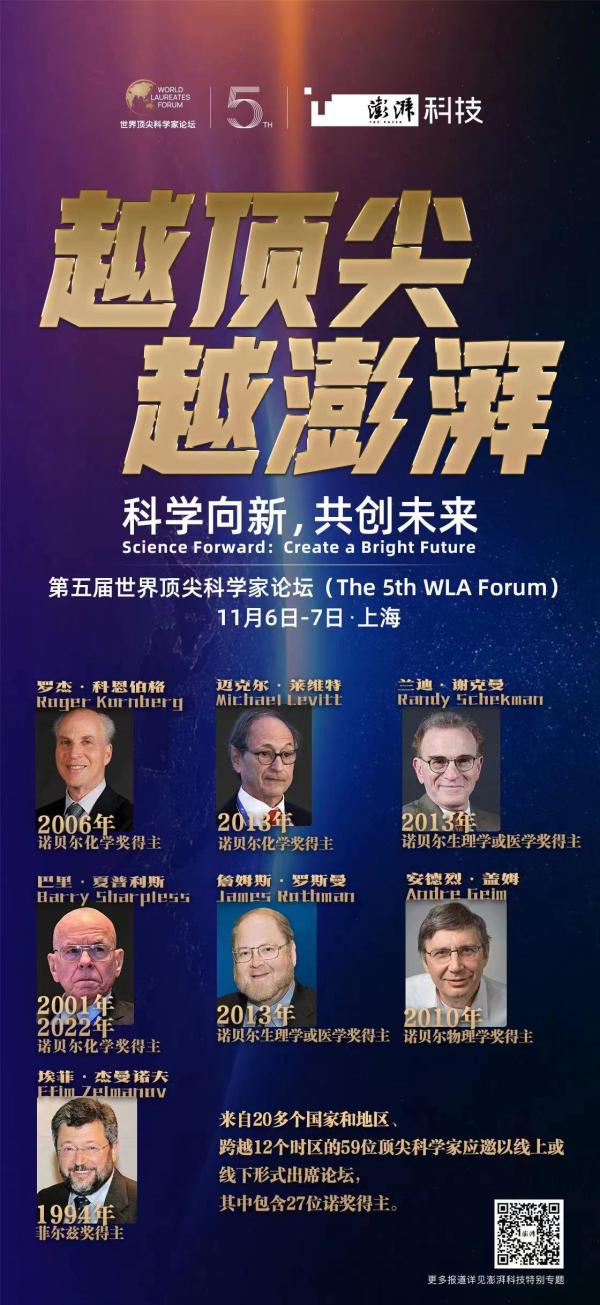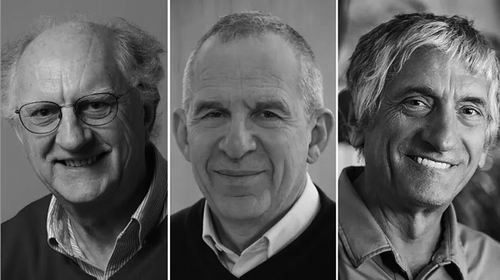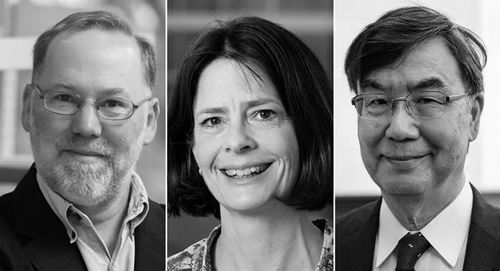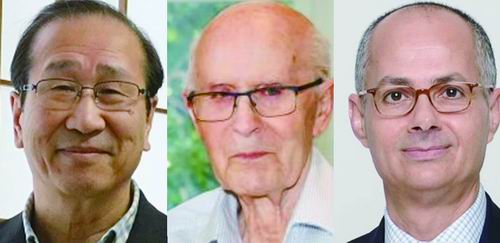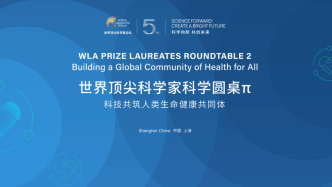
Scientists believe that it is crucial to let science reach more people, especially young people. This requires more scientists to join the science popularization team and disseminate science in a more innovative and fun way.
Some scientists are not good at words, so popular science can not only rely on scientists, but also rely on those who are good at speaking, such as Carl Sagan (Carl Sagan), who is not a scientist, but has given scientific knowledge about the universe to generations.
On the afternoon of November 7th, the last event of the 5th World Top Scientists Forum - Science Roundtable of World Top Scientists: Science and Technology Build a Community of Human Life and Health, was held online. Randy Schekman, winner of the 2013 Nobel Prize in Physiology or Medicine, moderated the meeting.
May-Britt Moser, winner of the 2014 Nobel Prize in Physiology or Medicine, Alim-Louis Burnaby, winner of the 2014 Lascaux Prize for Clinical Medical Research, 2022 Association of the World's Leading Scientists Award The world's top scientists such as life science or medicine award winner Dirk Gerlich attended the meeting and discussed issues such as "what is basic science" and "how to make science affect more people".
Scientists believe it is crucial to let science reach more people, especially young people. This requires more scientists to join the science popularization team and disseminate science in a more innovative and fun way. Mosol shared her experience of giving a speech with a rock band: "Most young people come to Queen, but we learned about astrophysics on the spot, and the atmosphere was very good."
At the roundtable, scientists also expressed their views on basic science. Ma Jianpeng, Dean of Fudan University's Institute of Complex Systems and Multiscale, recommended the book "The Usefulness of Useless Knowledge" that he had just read. Fundamental science that seems unlikely to make significant progress holds many answers. Randy Schekman also said that just like the scientists who first studied fruit flies never published important papers in their lives, at least six scientists later won the Nobel Prize for their research on fruit flies.
How Science Infuses New Power
Kurt Wittrich, winner of the 2002 Nobel Prize in Chemistry, believes that, first, more scientists need to be invited to discuss a wider range of topics. He said that he once held an event with young scientists, and everyone said it was very interesting and inspired. He said that the World Top Scientists Forum can cooperate with more institutions, carry out activities in different regions, and join hands with young scientists to solve current challenges in innovative ways. "To get young scientists to join our project, they really need that kind of guidance," Wittrich said.
Ma Jianpeng said that to attract young people to do science, "examples" are very important. For example, under the influence of family education, if the parents are scientists, the children may also be engaged in scientific research. Of course, there are many more children who are not born in science homes, which requires scientific events such as the Forum of the World's Leading Scientists to influence young people, especially those very young, who need heroic figures to carry them out. lead, and scientists are the perfect candidate.
Dong Jiajia, a professor at Shanghai Jiaotong University's School of Translational Medicine, emphasized that the World's Top Scientists Forum is a good platform for young people to meet "heroes". It is necessary to involve more young people, to inspire and inspire these high school students and college students. For them, the experience of seeing Nobel Prize winners will be unforgettable.
what is basic science
During the roundtable, many scientists expressed their views on basic science.
Ma Jianpeng said that he was recently reading a book: "The Usefulness of Useless Knowledge". The book said that the key and usefulness of useless knowledge is basic scientific knowledge.
"We are now in the era of in-depth development of applied science, and high-tech products are emerging one after another. Many people have also realized that, in fact, without these basic principles, there is no so-called 'cold science' to lay the foundation, and it is difficult for applied science to achieve breakthroughs. Science and applied science should go hand in hand. If there is no quantum mechanics, how can there be electric power applications? We need to face up to basic science. The deeper the development of applied science, the higher the importance of basic science." Ma Jianpeng said.
Ma Jianpeng believes that the most basic research that can affect other scientific research fields may not necessarily reflect and highlight its huge influence and importance at that time, but time will prove its importance. Therefore, we should not judge the significance and value of a research from the perspective of pragmatism, otherwise it is likely to push scientific research into the field of "noise".
Randy Schekman very much agrees. He gave an example he liked at the scene: "I knew a geneticist at Caltech who was the first to propose a fruit fly variant about 30 years ago. Over the next ten years, He's been doing research on it, but he hasn't published a paper on it. After the Ph.D. died, his students continued the research and won the Nobel Prize for it. This is actually very common in the scientific field."
Gao Xiang, a Distinguished Professor of the School of Public Health of Fudan University, also gave an example: "My son's favorite game is jigsaw puzzles. In fact, I think doing scientific research is the same as jigsaw puzzles, but fundamental research should be able to connect existing knowledge together and put it together little by little. The puzzle piece that comes up is basic research.”
Geerlich believes that there are so many things worth discovering and describing in nature, so it is difficult to classify which knowledge is basic and which is applied. This kind of speculative thinking is not necessarily Benefit us, so don't have pre-set thinking, just simply use curiosity to discover new undiscovered phenomena, which may contain great value.
How science "flyed into the homes of ordinary people"
As for how to bring "advanced" science to the public, several scientists have something to say.
Gao Xiang believes that it is very important to make the public feel that science is not boring. In addition to that, get the public excited about learning about science, and at the same time collaborate with the mass media to use new media to promote real science.
Gao Fu, an academician of the Chinese Academy of Sciences, said: We must let the public know the development of science and at the same time realize the importance of science. This is a very important issue in the next five years, and I hope that more forums like the World Top Scientists Conference will be held to play an important role in popularizing science to the public.
Making complex science simple is also important. Gao Fu gave an example: "I wrote a book on popularizing the new crown epidemic, and I described it as 'inevitable virus and disease'. So it is very important for people to understand, and we should encourage all scientists to explain to everyone why Do this research and why it matters."
Randy Schekman also said that scientists do need to communicate with the public, which is one of the challenges facing science. Of course, some scientists are not good at words, so popular science can't just rely on scientists, but also on people who are good at speaking, such as Carl Sagan, who is not a scientist, but has given science knowledge about the universe to generations. In the future science popularization work, it is necessary to attract such people to stimulate the public's enthusiasm for science.
Mosol also shared her experience of popular science: "There are also such popular science activities in Germany. We translate scientific knowledge into a language that everyone can understand, such as turning scientific knowledge into paintings. I recently participated in a related event in Norway. At the same time, we invited the Queen band to the scene for the popular science activities of aerospace. There were about 9,000 seats, and there were no empty seats. Most of the young people came to the rock band. We used this to popularize the knowledge related to astrophysics, and the atmosphere was very good. ,very interesting."
The World Laureates Association is the world's largest non-governmental, non-profit organization of scientists. It takes "science and technology for the common destiny of mankind" as its purpose and practices "promoting basic science, advocating international cooperation, and supporting the growth of young people". The three missions are to promote global scientists to carry out various fruitful scientific research and academic exchange activities with China and other countries in the world.
